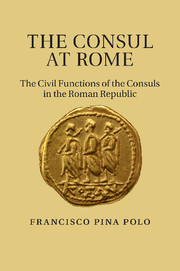Book contents
- Frontmatter
- Contents
- List of illustrations
- Acknowledgements
- Introduction
- PART I THE CONSULAR FUNCTIONS IN THE PRE-SULLAN AGE (367–81)
- 1 The consuls taking office
- 2 Consuls and civic religion
- 3 Consuls, the agents of diplomacy in the Roman state
- 4 Communication between the consuls and the people: edicts and contiones
- 5 Consuls as legislators
- 6 The jurisdiction of the consuls
- 7 Consuls as promoters of public works
- 8 Colonization and distribution of land
- 9 Appointment of a dictator
- 10 Consuls presiding over elections
- 11 The consular year in the pre-Sullan age
- PART II THE CONSULAR FUNCTIONS IN THE POST-SULLAN AGE (80–50)
- 15 Conclusion
- Bibliography
- Index of Subjects
- Index of Ancient Sources
- Index of Ancient Personal Names
2 - Consuls and civic religion
Published online by Cambridge University Press: 25 October 2011
- Frontmatter
- Contents
- List of illustrations
- Acknowledgements
- Introduction
- PART I THE CONSULAR FUNCTIONS IN THE PRE-SULLAN AGE (367–81)
- 1 The consuls taking office
- 2 Consuls and civic religion
- 3 Consuls, the agents of diplomacy in the Roman state
- 4 Communication between the consuls and the people: edicts and contiones
- 5 Consuls as legislators
- 6 The jurisdiction of the consuls
- 7 Consuls as promoters of public works
- 8 Colonization and distribution of land
- 9 Appointment of a dictator
- 10 Consuls presiding over elections
- 11 The consular year in the pre-Sullan age
- PART II THE CONSULAR FUNCTIONS IN THE POST-SULLAN AGE (80–50)
- 15 Conclusion
- Bibliography
- Index of Subjects
- Index of Ancient Sources
- Index of Ancient Personal Names
Summary
Paradoxically, Polybius does not mention religious duties amongst those performed by the consuls, despite the fact that some of these tasks were compulsory and according to Roman belief their fulfilment was of great importance to the welfare of the community. In fact, the religious duties conducted by the consuls during the first few weeks of office were amongst their most important functions. Roman religion was national and civic, and its practice was a political issue since it concerned the entire community. Most religious activities were performed in public following stringent rules, and their main purpose was to maintain or to restore the peace of the gods (pax deorum). Experts grouped into various priestly colleges served as essential, qualified advisers, but the management of religious affairs was in the hands of the senate, and the direct relationship between the community and the gods was assigned to the magistrates, especially to the consuls as supreme magistrates of the civitas.
The first public ceremony conducted by the consuls consisted of visiting the temple of Jupiter on the Capitolium, to make their prayers to the supreme divinity of the Roman pantheon for the welfare of the community. The vows taken by the consuls on the day they assumed their duties must be seen as public vows (vota publica). The exact content of the vows is not known, nor whether there was a fixed formula set out by the senate or by a priestly college, in particular by the pontiffs.
- Type
- Chapter
- Information
- The Consul at RomeThe Civil Functions of the Consuls in the Roman Republic, pp. 21 - 57Publisher: Cambridge University PressPrint publication year: 2011
- 1
- Cited by



